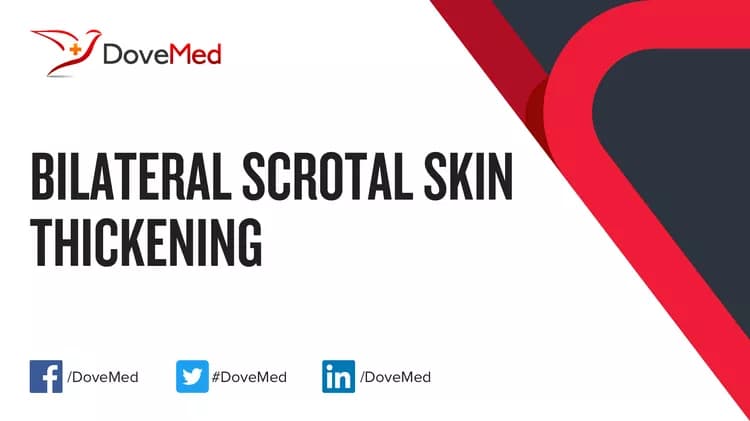
Bilateral Scrotal Skin Thickening: Causes, Symptoms, and Treatment
Introduction:
Bilateral scrotal skin thickening is a medical condition that can be alarming for men. It causes thickening of the skin around the scrotum, which can be uncomfortable and lead to other issues. In this article, we will discuss the causes, symptoms, and treatment options available for this condition.
What are the Causes of Bilateral Scrotal Skin Thickening?
There are various causes of bilateral scrotal skin thickening. Some of the most common causes include:
- Infections: Infections in the scrotal region can cause skin thickening. These infections can be bacterial, viral, or fungal. Examples include jock itch, folliculitis, and scabies.
- Inflammation: Inflammatory conditions like psoriasis, eczema, and lichen planus can cause thickening of the scrotal skin.
- Trauma: Trauma to the scrotal region, such as a direct blow, can lead to thickening of the skin.
- Cancer: In rare cases, skin thickening can be a sign of cancer. For instance, testicular cancer can cause thickening of the scrotal skin.
- Other medical conditions: Certain medical conditions such as obesity, hypothyroidism, and diabetes can also cause bilateral scrotal skin thickening.
What are the Signs and Symptoms of Bilateral Scrotal Skin Thickening?
The symptoms of bilateral scrotal skin thickening may vary depending on the underlying cause. However, some of the most common symptoms include:
- Thickening of the skin: The skin around the scrotum may appear thicker and feel harder to the touch.
- Itching: In some cases, the skin may be itchy, red, and irritated.
- Pain: If the skin is inflamed, it may be painful to the touch.
- Changes in color: The skin may become discolored, with a reddish or purplish hue.
- Swelling: Swelling of the scrotal region may occur due to fluid buildup in the tissues.
- Ulcers: In rare cases, scrotal skin thickening may lead to the development of ulcers on the skin.
How is Bilateral Scrotal Skin Thickening Treated?
The treatment for bilateral scrotal skin thickening depends on the underlying cause. Some of the treatment options include:
- Medications: If the cause of skin thickening is an infection, medications such as antibiotics, antifungal or antiviral drugs may be prescribed.
- Topical creams: Inflammatory conditions can be treated with topical creams that contain corticosteroids, which reduce inflammation and itching.
- Surgery: In rare cases, surgery may be necessary to remove cancerous cells or cysts.
- Lifestyle changes: For those with medical conditions such as obesity, diabetes, and hypothyroidism, lifestyle changes like diet and exercise may be recommended to manage the condition and reduce symptoms.
- Home remedies: Some home remedies may also help alleviate symptoms of scrotal skin thickening. Examples include:
- Applying a cool compress to the affected area to reduce itching and inflammation
- Wearing loose-fitting clothing to avoid further irritation to the skin
- Keeping the area clean and dry to prevent infection
- Using over-the-counter antifungal creams to treat fungal infections
How is Bilateral Scrotal Skin Thickening Prevented?
Preventing bilateral scrotal skin thickening can be challenging as it depends on the underlying cause. However, there are some measures that men can take to reduce their risk of developing this condition, such as:
- Maintaining good hygiene: Keeping the scrotal area clean and dry can help prevent infections that can cause skin thickening.
- Wearing protective gear: Men who engage in sports that involve contact with the scrotal area, such as football or hockey, should wear protective gear to prevent trauma to the area.
- Treating medical conditions promptly: Managing medical conditions like diabetes, hypothyroidism, and obesity can help prevent skin thickening.
- Avoiding irritants: Men should avoid using products that can irritate the skin, such as harsh soaps, laundry detergents, and fabric softeners.
Conclusion:
Bilateral scrotal skin thickening is a medical condition that can cause discomfort and lead to other issues. It can be caused by infections, inflammation, trauma, cancer, or other medical conditions. Symptoms may include skin thickening, itching, pain, changes in color, swelling, and ulcers. Treatment depends on the underlying cause and may involve medications, topical creams, surgery, lifestyle changes, or home remedies. Men can prevent skin thickening by maintaining good hygiene, wearing protective gear, treating medical conditions promptly, and avoiding irritants. If you notice any changes in your scrotal skin, it's important to consult your healthcare provider to determine the underlying cause and receive appropriate treatment.
Hashtags: #scrotalskinthickening #bilateral #causes #symptoms #treatment #prevention
Related Articles
Test Your Knowledge
Asked by users
Related Centers
Related Specialties
Related Physicians
Related Procedures
Related Resources
Join DoveHubs
and connect with fellow professionals

0 Comments
Please log in to post a comment.